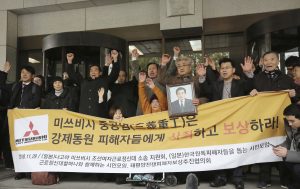Japan and South Korea remain embroiled in an international legal dispute over the interpretation of the 1965 Agreement Between Japan and the Republic of Korea Concerning the Settlement of Problems in Regard to Property and Claims and Economic Cooperation. The agreement is clearly a lump-sum settlement agreement with respect to claims arising from Japan’s annexation of Korea from 1910 to 1945. Under the agreement, Korea received $300 million from Japan, as full and final settlement for claims between states, claims between one state and the individuals of the other, and claims among the individuals of the states, including those specified in Article IV (a) of the 1951 San Francisco Peace Treaty. Private companies were also considered individuals for the purposes of the agreement.
Nevertheless, in October 2018, the Supreme Court of Korea handed down a surprise decision, which ruled that Japanese private companies must compensate workers from the Korean peninsula who were called up to work for those companies during the Pacific War. The ruling is based on the premise that the 1910 Japan-Korea Annexation Treaty was illegal, null and void under the1948 Korean Constitution. While the Korean government strongly supports the Court’s decision, the Japanese government argues that it is not consistent with the 1965 Agreement.
First, neither Korea nor Japan placed any restrictions on the scope of the claims that were settled by the 1965 Agreement. Although there are some exceptions defined in Article 2 (2), it is clear that the claims of the alleged victims were not considered exceptions in the 1965 Agreement. According to the general principles of international law on the interpretation of treaties, any interpretation of the 1965 Agreement must conclude that these claims were completely and finally settled.
The Korean government did not abandon the alleged victims when it concluded the 1965 Agreement; in fact, the agreement was an outcome of the Korean government’s active diplomatic efforts on their behalf. Having already used diplomatic measures, the Korean government cannot exercise them again.
So who bears a legal responsibility for providing compensation to workers mobilized against their will? Because the 1965 Agreement was based on the premise that the Korean government would pay compensation using $300 million received from Japan, then the responsibility rests with the Korean government. Indeed, the Korean government has already compensated the alleged victims of Japan’s annexation of Korea through special legislation. If victims remain, they may demand compensation from the Korean government.
As for the question of whether the 1910 Japan-Korea Annexation Treaty was illegal, null and void – that is a question that needed to be decided by international law prevailing at the time. The Korean courts cannot unilaterally apply the 1948 Korean constitution in dealing with the legality of the 1910 Annexation Treaty, and in doing so the Supreme Court’s ruling is hardly consistent with international law.
In concluding both the 1965 Treaty on Basic Relations between Japan and the Republic of Korea and the 1965 Agreement Between Japan and the Republic of Korea Concerning the Settlement of Problems in Regard to Property and Claims and Economic Cooperation, Korea and Japan clearly “agreed” that two countries “disagreed” over the legality of the 1910 Annexation Treaty. This “agree to disagree” is a very unique characteristic of modern Korea-Japan relations, and it precludes the matter of the 1910 Annexation Treaty from being a focal point in interpreting the 1965 Agreement.
In short, the 1965 Agreement requires the Korean government to compensate alleged Korean victims. However, the Korean government believes that Japan is still obliged to pay compensation. This is the ongoing international legal dispute between two countries in a nutshell.
How to resolve it? According to the 1965 agreement, a settlement must first be pursued through diplomatic negotiation, and if that fails, the dispute must be resolved through international arbitration. As the Korean government has resisted a diplomatic settlement, the Japanese government has suggested international arbitration, in accordance with the 1965 Agreement. As such, if the Korean government believes that the Supreme Court’s ruling of 2018 is consistent with international law, international arbitration would be the best option to resolve the dispute with Japan once and for all. In contrast, if the Korean government resists international arbitration on the grounds that it may lose the case, it could have repercussions for Korea’s international credibility.
To maintain democracy and peace in East Asia with Japan, the Korea government must act quickly to settle the dispute with Japan in accordance with international law and the 1965 Agreement.
Jinyul Ju is a professor at Pusan National University Law School (Korea).

































